中考英语二轮语法复习课件-专题11 时态
文档属性
| 名称 | 中考英语二轮语法复习课件-专题11 时态 | 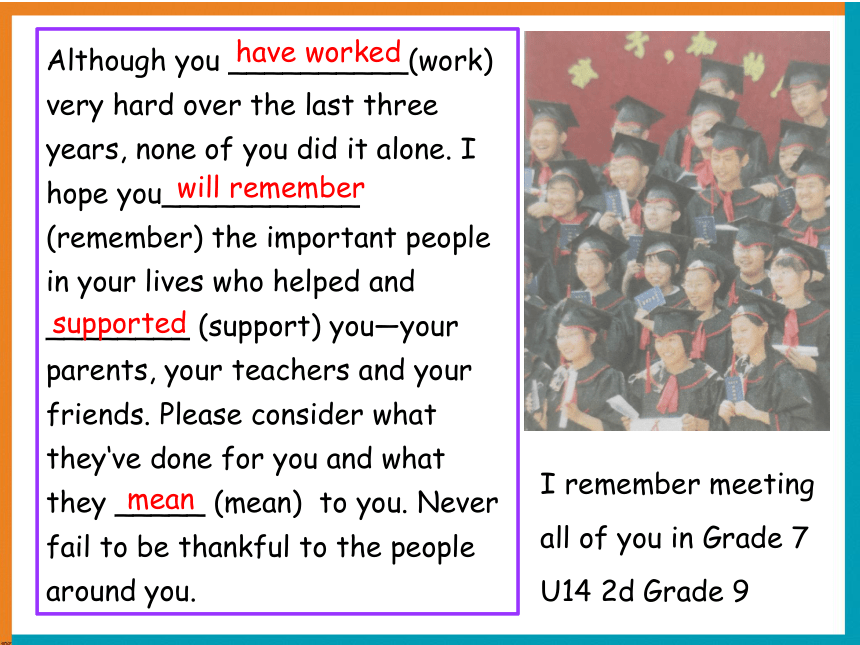 | |
| 格式 | pptx | ||
| 文件大小 | 1.6MB | ||
| 资源类型 | 试卷 | ||
| 版本资源 | 人教新目标(Go for it)版 | ||
| 科目 | 英语 | ||
| 更新时间 | 2022-05-13 09:01:07 | ||
图片预览

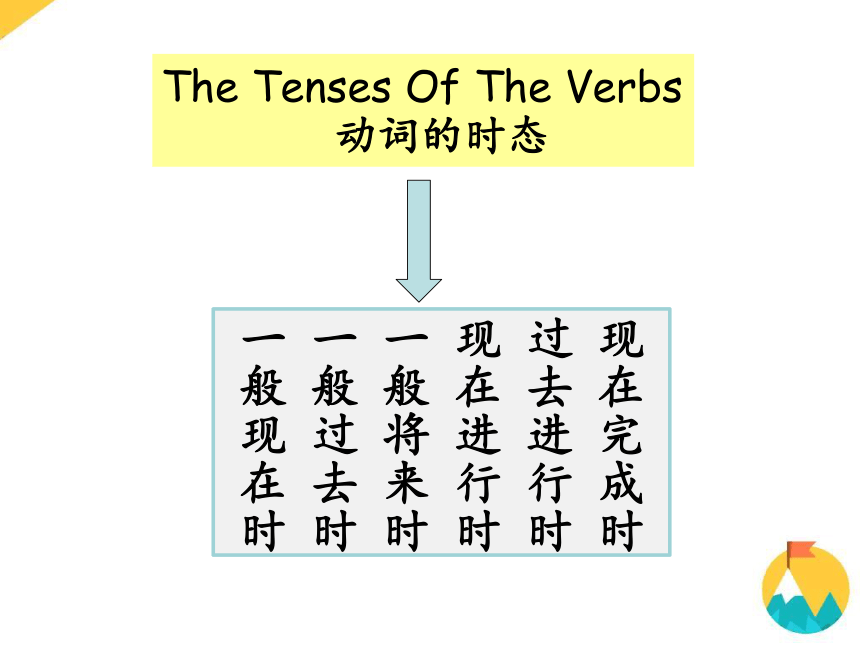
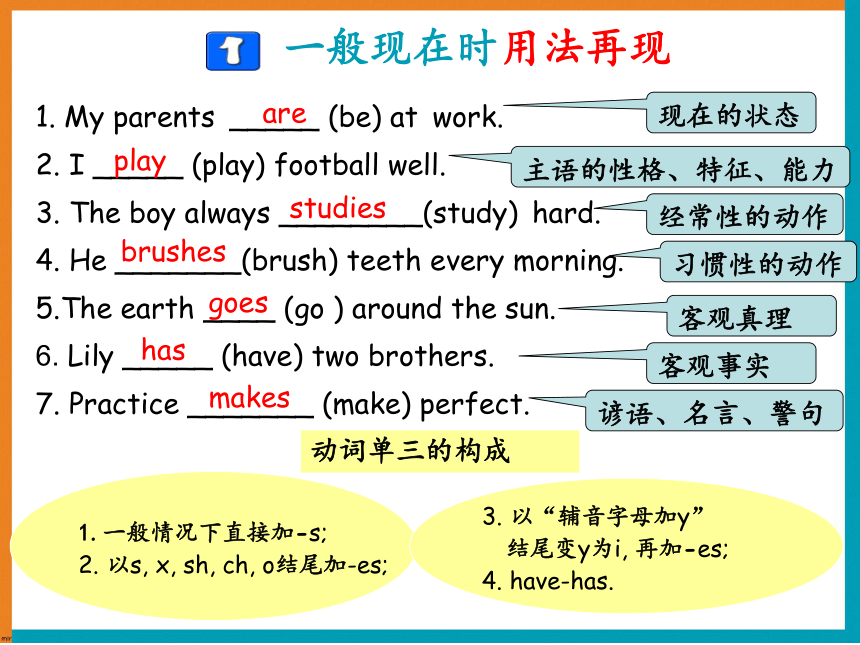
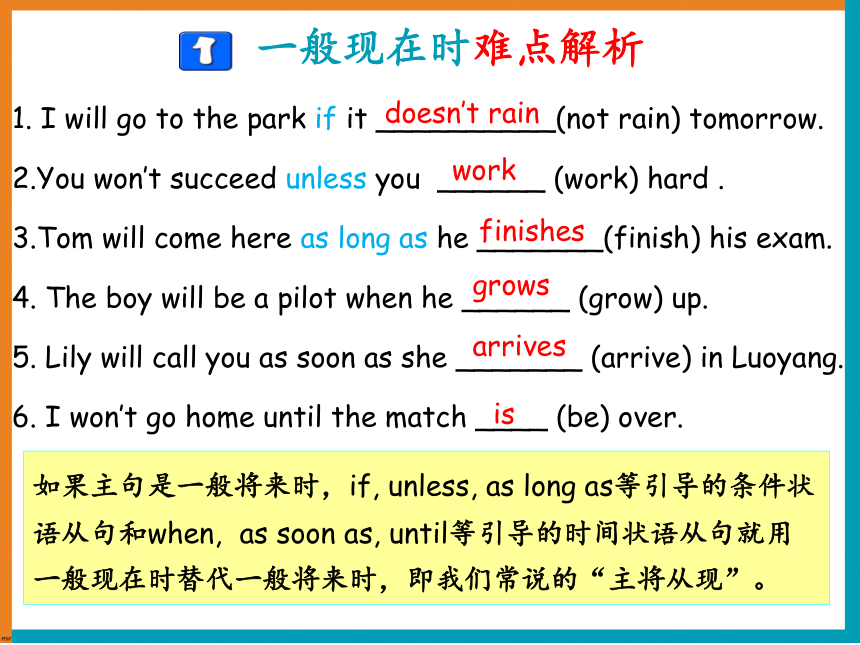
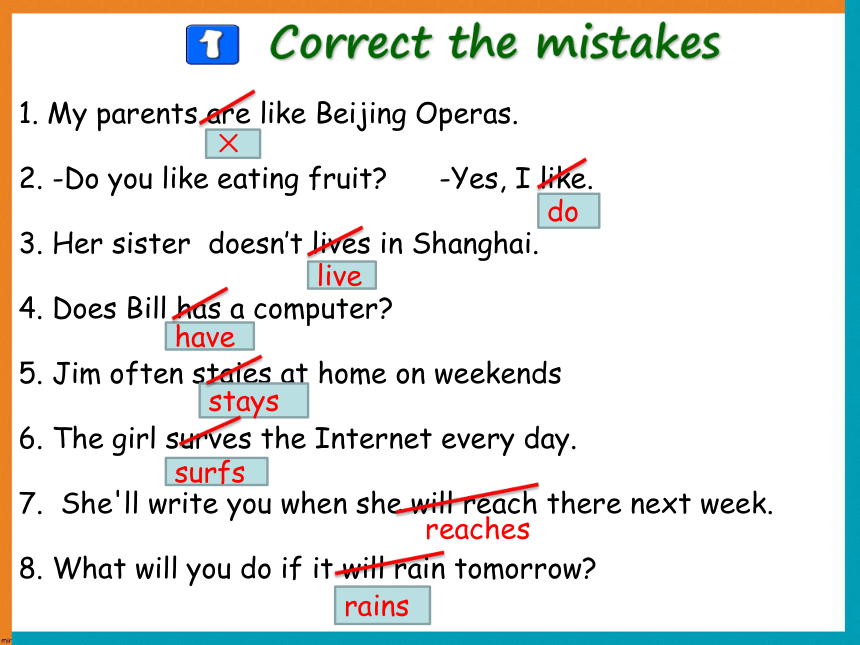
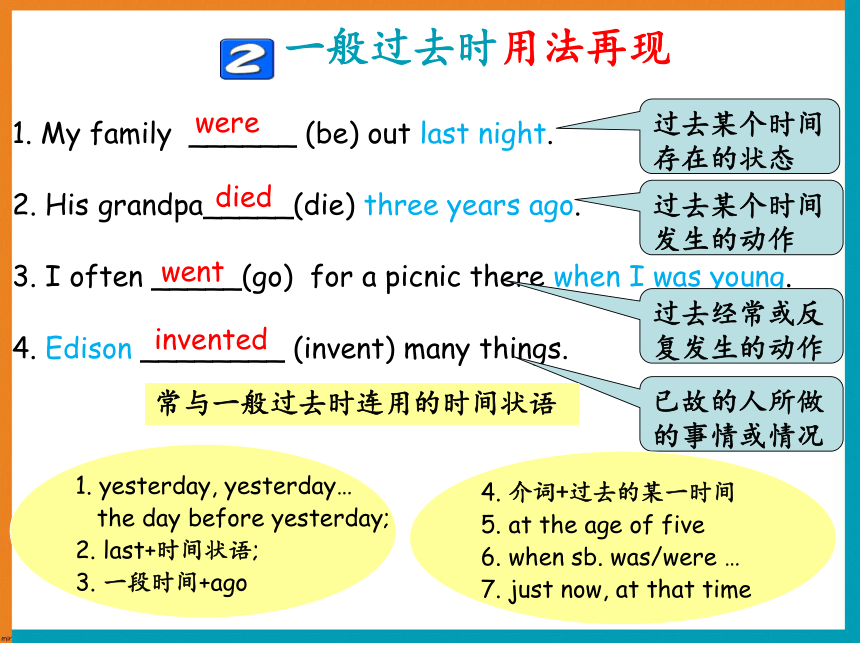
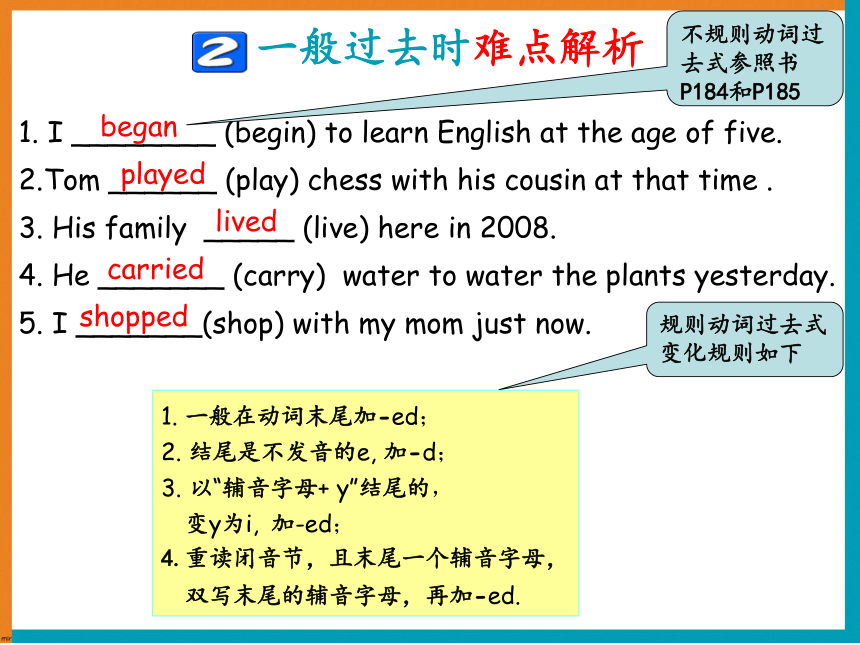

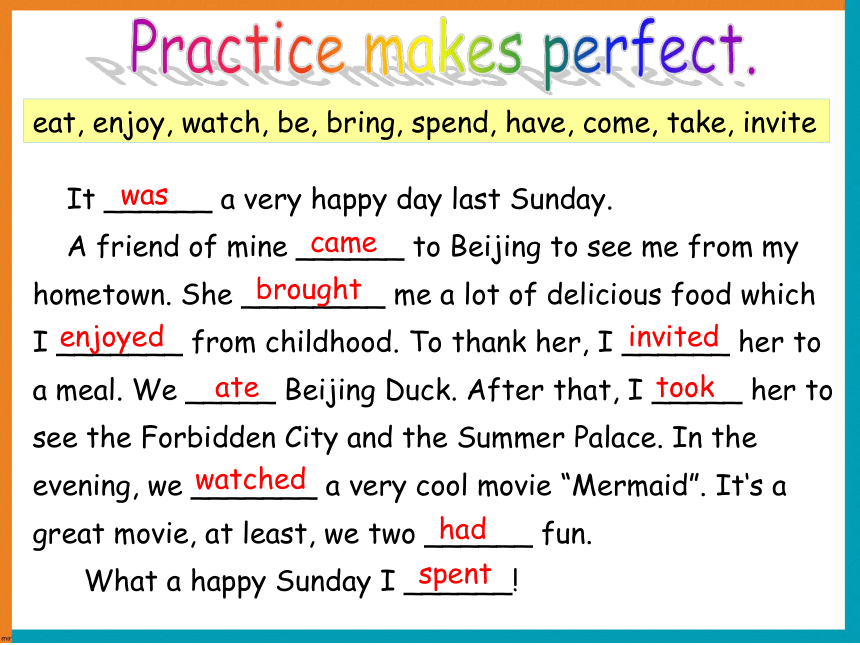
文档简介
(共25张PPT)
Although you __________(work) very hard over the last three years, none of you did it alone. I hope you___________ (remember) the important people in your lives who helped and ________ (support) you—your parents, your teachers and your friends. Please consider what they‘ve done for you and what they _____ (mean) to you. Never fail to be thankful to the people around you.
mean
supported
have worked
will remember
I remember meeting
all of you in Grade 7
U14 2d Grade 9
现在完成时
过去进行时
现在进行时
一般将来时
一般过去时
一般现在时
The Tenses Of The Verbs
动词的时态
1. My parents _____ (be) at work.
2. I _____ (play) football well.
3. The boy always ________(study) hard.
4. He _______(brush) teeth every morning.
5.The earth ____ (go ) around the sun.
6. Lily _____ (have) two brothers.
7. Practice _______ (make) perfect.
一般现在时用法再现
are
play
studies
goes
makes
has
brushes
现在的状态
主语的性格、特征、能力
经常性的动作
习惯性的动作
客观真理
客观事实
谚语、名言、警句
动词单三的构成
1.一般情况下直接加-s;
2. 以s, x, sh, ch, o结尾加-es;
3. 以“辅音字母加y”
结尾变y为i, 再加-es;
4. have-has.
1. I will go to the park if it __________(not rain) tomorrow.
2.You won’t succeed unless you ______ (work) hard .
3.Tom will come here as long as he _______(finish) his exam.
4. The boy will be a pilot when he ______ (grow) up.
5. Lily will call you as soon as she _______ (arrive) in Luoyang.
6. I won’t go home until the match ____ (be) over.
一般现在时难点解析
doesn’t rain
work
finishes
如果主句是一般将来时,if, unless, as long as等引导的条件状语从句和when, as soon as, until等引导的时间状语从句就用一般现在时替代一般将来时,即我们常说的“主将从现”。
grows
arrives
is
1. My parents are like Beijing Operas.
2. -Do you like eating fruit -Yes, I like.
3. Her sister doesn’t lives in Shanghai.
4. Does Bill has a computer
5. Jim often staies at home on weekends
6. The girl surves the Internet every day.
7. She'll write you when she will reach there next week.
8. What will you do if it will rain tomorrow
×
surfs
rains
have
live
stays
do
Correct the mistakes
reaches
1. My family ______ (be) out last night.
2. His grandpa_____(die) three years ago.
3. I often _____(go) for a picnic there when I was young.
4. Edison ________ (invent) many things.
一般过去时用法再现
were
died
过去某个时间存在的状态
过去某个时间
发生的动作
过去经常或反
复发生的动作
已故的人所做的事情或情况
常与一般过去时连用的时间状语
went
invented
1. yesterday, yesterday…
the day before yesterday;
2. last+时间状语;
3. 一段时间+ago
4. 介词+过去的某一时间
5. at the age of five
6. when sb. was/were …
7. just now, at that time
1. I ________ (begin) to learn English at the age of five.
2.Tom ______ (play) chess with his cousin at that time .
3. His family _____ (live) here in 2008.
4. He _______ (carry) water to water the plants yesterday.
5. I _______(shop) with my mom just now.
一般过去时难点解析
played
carried
shopped
1. 一般在动词末尾加-ed;
2. 结尾是不发音的e, 加-d;
3. 以“辅音字母+ y”结尾的,
变y为i, 加-ed;
4.重读闭音节,且末尾一个辅音字母,
双写末尾的辅音字母,再加-ed.
began
lived
不规则动词过去式参照书P184和P185
规则动词过去式
变化规则如下
1. - What ____ (be) the noise, Bill
- Sorry, I broke my glass.
2. - Haven't I told you that you should be home earlier
- Yes, but I _____(come) home earlier than I usually do.
3. - Are you going anywhere
- I ________(think) about visiting my sister, but I have
changed my mind.
4. - There is someone knocking at the door.
- It must be the computer repairman. I _______(call)
him to fix my computer.
5. – Hello, mum. Are you still on Lushan Mountain
- Oh, no. We are back home. We ____ (have) a really
good journey.
6. - I hear Mr. Zhang has gone to Beijing for a meeting.
- Really Do you know when he ______ (leave)
was
came
thought
called
had
left
一般过去时真题演练
没有时间状语,你如
何判断使用哪种时态?
Practice makes perfect.
It ______ a very happy day last Sunday.
A friend of mine ______ to Beijing to see me from my hometown. She ________ me a lot of delicious food which
I _______ from childhood. To thank her, I ______ her to
a meal. We _____ Beijing Duck. After that, I _____ her to see the Forbidden City and the Summer Palace. In the evening, we _______ a very cool movie “Mermaid”. It‘s a great movie, at least, we two ______ fun.
What a happy Sunday I ______!
was
came
brought
enjoyed
invited
ate
took
eat, enjoy, watch, be, bring, spend, have, come, take, invite
watched
spent
had
1. Next Sunday _____ (be) my birthday.
2. He________(come)back in three days.
3. I _____________(swim) this weekend.
4. The exchange students _________(leave) Luoyang soon.
一般将来时用法再现
will come
am going to swim
will be
将来存在的的状态
将来发生的动作
打算做某事
一般将来时构成特点
1. will/shall + 动词原形 2. be gong to + 动词原形
3. go, come, leave, fly等表示位置移动的词常用现在进行时表示将来
常与一般将来时连用的时间状语
tomorrow, the day after tomorrow, next (week, month, year…),
soon, this afternoon/evening/Sunday, in +一段时间
are leaving
现在进行时表将来
一般将来时易错点解析
be
be
“某处将有…” 有两种表达方法:
There will be ...
There is/are going to be...
1. There is going to have a sports meeting in our school.
2. There will have two big shopping center here.
1. My sister wants a new dress. She_________ wear it
to the party.
2. Traveling to space is no longer just a dream. Russia
________ (build) the first hotel in space in the near
future.
3. If he goes there, he ________ (have) a good time.
4. When the cat is away, the mice _________ (play).
5. Finish your homework first, or I ________(not let)
you go out.
6. - When ____ you ______ (finish) reading Jane Eyre
- It’s hard to say. I’m busy recently.
is going to
will have
will build
will play
won’t let
will finish
一般将来时真题演练
没有时间状语,你如
何判断使用哪种时态?
1. I_________ (cook) in the kitchen now.
2. Look! Lucy_________ (swim) over there.
3. Don't talk. The baby ______ (lie) and sleeping on the
bed.
现在进行时用法再现
are taking
is lying
am cooking
现在正在发生或进行的动作
现阶段正在发生或进行的动作
is swimming
4. The Students ________(take) online lessons these days.
用在现在进行时中的标志词
1. now, at present, at the moment
2. these days, this week /month
3. Look! Listen! 后的句子
4.特定情况下, 如:
It’s twelve o’clock./Don’t talk! …
动词ing的构成
1. 一般情况下, 在动词原形后直接加ing;
2. 以不发音字母e结尾的动词, 先去掉e,
再加ing;
3. 重读闭音节, 双写末尾的辅音字母,
再加-ing;
4. 以ie结尾的重读闭音节词,将ie改成y
再加ing.
1. Li Ming ___ always ________ (help) others.
2. Those men ____ always ______ (talk).
Extension
is helping
are talking
动词现在进行时常与always搭配使用,表示反复出现或习惯性的动作,隐含说话人的赞扬、喜好或厌恶的情绪。
are preparing
are going
1. – What’s the noise
- Oh, I forgot to tell you. The neighbors ____________
(prepare) for the party.
2. The zoo keepers is worried because the number of
visitors __________ (become) smaller and smaller.
3. - Could you help me do the dishes
- Sorry, my sister ________ (wait) for me outside now.
4. - Paul, I'm busy cooking. Can you give a hand
- Just a minute. I__________ (check) my e-mail.
5. - Does this bus go to the beach
- No. You ________ (go) the wrong way. You want the
Number 11.
is waiting
is becoming
am checking
现在进行时真题演练
1. She __________ (sit) on the grass and drawing a
picture at 5:00 yesterday.
2. When the bell rang, I __________ (walk) along the river.
3. While the alien __________ (buy) a souvenir, the girl
called the police.
4. His parents ____________(listen) to music from 11:00
to 12:00 yesterday.
过去进行时用法再现
was walking
was buying
was sitting
过去某一时间正在发生或进行的动作
过去一段时间正在发生或进行的动作
were listening
常与过去进行时连用的时间状语:
1. at this time yesterday,
at five o’clock yesterday,
from…to… yesterday,
between…and… yesterday…
2. when和while引导的时间状语从句。
过去进行时构成特点
主语 + was / were + 现在分词
1. Some exchange students ____________ (chat) with their
host families at this time yesterday.
2. - I called you this morning, but nobody answered it.
- Oh, we _________ (do) some running in the park.
3. - What did the teacher say just now
- Sorry, I didn’t hear it. I _________ (look) out of the
window.
4. - Could you tell me what he said just now
- Sorry, I _________ (think) what was happening outside.
5. Last night, I __________ (play) computer games when my
mother went into my bedroom.
was looking
was playing
were chatting
were doing
was thinking
过去进行时真题演练
1. - I’d like to introduce my best friend to you, peter.
- Thank you, Lucy. But we ________ (meet) already.
2. - Why are you standing here, Mrs. White
- I'm waiting for my son. He __________ (not come)
back from school.
3. Joe, my close friend, moved to Beijing five years ago, and
I __________ (see) him since then.
4. - Do you know the Englishman
- Yes. I _________ (know) him for two years.
现在完成时用法再现
have known
haven’t seen
表示过去发生
或已经完成的
动作对现在造
成影响或后果
发生在过去某一时刻,持续到现在的动作
have met
hasn't come
for + 时间段
since + 时间点名词/since + 从句(从句用一般过去式)
时间状语:already, yet, just, ever, never, once, twice/…, before, so far,
in the past/last few years等
1.我哥哥去美国三年了。
现在完成时难点解析
My brother has gone to America for three years.
X
My brother has been in America for three years.
2.我自从一周前就离开洛阳了。
I have left Luoyang since a week ago.
I have been away from Luoyang since a week ago.
X
3.你买这辆自行车多长时间了?
How long have you bought this bike?
X
How long have you had this bike?
常见的非延续变成延续性的方法
1. be + prep. : go to → be in/begin → be on/…
2. be + adj./adv.:die → be dead/leave →be away/ …
3.变成另一个动词:borrow → keep buy → have/…
for + 时间段,since +时间点及
how long的动词必须是延续性的
现在完成时易错点辨析
3.-你去哪儿了?
-我去图书馆了。
X
-Where have you gone?
-I have gone to the library.
-Where have you been?
-I have been to the library.
have been to SP 到过某地
have gone to SP 到某地去了(仅用于第三人称)
have been in SP 一直在某地了多久
1.他父母以前从来没有到过东京。
2.我们的数学老师在我们学校教了20年了。
3.Lily去上海了。
4.那些孩子们自从我离开广州就到那儿了。
5.过去几年我们城市发生了巨大变化。
Great changes have taken place in our city in the last
few years.
His parents have never been to Tokyo before.
Our math teacher has in our school for 20 years.
Lily has gone to Shanghai.
The children have been there since I left Guangzhou.
现在完成时真题演练
How time flies! I have studied in my school for three years. And I __________from middle school in a month. I am eager to share my happiness and sadness with you.
I had so many memories in three years’ life. One of them impressed me very much. I still remember, when I ______ to feel upset and __________about giving up English, my English teacher had a talk with me about how to learn English well. Since then, she ________helping me. Little by little, I am interested in English and my English _________better and better. I think I am so lucky to become one of her students. I have learned a lot from her.
I will try to help others when they ____ in trouble. I think it is a happy thing to help others.
will graduate
is getting
are
has kept
began
was thinking
think, get, begin, be, graduate, keep
链接中考
语篇填空
Do you know the book Tom Sayer It’s one of ________ greatest works of Mark Twain. It’s about a boy growing up along the Mississippi River. Now let’s learn a small part of it.
Every boy wants _______ find treasure and Tom was no exception (例外).
One day Tom told Huck about his idea.
“Where can we look for treasure ” asked Huck.
“It _____ hidden on islands (岛屿), under dead trees.”
One afternoon Tom and Huck went to _____ island by boat. It was a lonely place. They could only see sand at first. Soon they saw a house. They went into it quietly, walked upstairs, but _______ was nothing there.
They were just about to leave when Tom stopped. Through the holes in the wooden floor, they saw two men downstairs. Tom and Huck were afraid when they heard one man speak…
the
to
is
an
there
背书打卡: [晚7:00前完成]
2. 独立完成一篇阅读和一篇补全对话。
Although you __________(work) very hard over the last three years, none of you did it alone. I hope you___________ (remember) the important people in your lives who helped and ________ (support) you—your parents, your teachers and your friends. Please consider what they‘ve done for you and what they _____ (mean) to you. Never fail to be thankful to the people around you.
mean
supported
have worked
will remember
I remember meeting
all of you in Grade 7
U14 2d Grade 9
现在完成时
过去进行时
现在进行时
一般将来时
一般过去时
一般现在时
The Tenses Of The Verbs
动词的时态
1. My parents _____ (be) at work.
2. I _____ (play) football well.
3. The boy always ________(study) hard.
4. He _______(brush) teeth every morning.
5.The earth ____ (go ) around the sun.
6. Lily _____ (have) two brothers.
7. Practice _______ (make) perfect.
一般现在时用法再现
are
play
studies
goes
makes
has
brushes
现在的状态
主语的性格、特征、能力
经常性的动作
习惯性的动作
客观真理
客观事实
谚语、名言、警句
动词单三的构成
1.一般情况下直接加-s;
2. 以s, x, sh, ch, o结尾加-es;
3. 以“辅音字母加y”
结尾变y为i, 再加-es;
4. have-has.
1. I will go to the park if it __________(not rain) tomorrow.
2.You won’t succeed unless you ______ (work) hard .
3.Tom will come here as long as he _______(finish) his exam.
4. The boy will be a pilot when he ______ (grow) up.
5. Lily will call you as soon as she _______ (arrive) in Luoyang.
6. I won’t go home until the match ____ (be) over.
一般现在时难点解析
doesn’t rain
work
finishes
如果主句是一般将来时,if, unless, as long as等引导的条件状语从句和when, as soon as, until等引导的时间状语从句就用一般现在时替代一般将来时,即我们常说的“主将从现”。
grows
arrives
is
1. My parents are like Beijing Operas.
2. -Do you like eating fruit -Yes, I like.
3. Her sister doesn’t lives in Shanghai.
4. Does Bill has a computer
5. Jim often staies at home on weekends
6. The girl surves the Internet every day.
7. She'll write you when she will reach there next week.
8. What will you do if it will rain tomorrow
×
surfs
rains
have
live
stays
do
Correct the mistakes
reaches
1. My family ______ (be) out last night.
2. His grandpa_____(die) three years ago.
3. I often _____(go) for a picnic there when I was young.
4. Edison ________ (invent) many things.
一般过去时用法再现
were
died
过去某个时间存在的状态
过去某个时间
发生的动作
过去经常或反
复发生的动作
已故的人所做的事情或情况
常与一般过去时连用的时间状语
went
invented
1. yesterday, yesterday…
the day before yesterday;
2. last+时间状语;
3. 一段时间+ago
4. 介词+过去的某一时间
5. at the age of five
6. when sb. was/were …
7. just now, at that time
1. I ________ (begin) to learn English at the age of five.
2.Tom ______ (play) chess with his cousin at that time .
3. His family _____ (live) here in 2008.
4. He _______ (carry) water to water the plants yesterday.
5. I _______(shop) with my mom just now.
一般过去时难点解析
played
carried
shopped
1. 一般在动词末尾加-ed;
2. 结尾是不发音的e, 加-d;
3. 以“辅音字母+ y”结尾的,
变y为i, 加-ed;
4.重读闭音节,且末尾一个辅音字母,
双写末尾的辅音字母,再加-ed.
began
lived
不规则动词过去式参照书P184和P185
规则动词过去式
变化规则如下
1. - What ____ (be) the noise, Bill
- Sorry, I broke my glass.
2. - Haven't I told you that you should be home earlier
- Yes, but I _____(come) home earlier than I usually do.
3. - Are you going anywhere
- I ________(think) about visiting my sister, but I have
changed my mind.
4. - There is someone knocking at the door.
- It must be the computer repairman. I _______(call)
him to fix my computer.
5. – Hello, mum. Are you still on Lushan Mountain
- Oh, no. We are back home. We ____ (have) a really
good journey.
6. - I hear Mr. Zhang has gone to Beijing for a meeting.
- Really Do you know when he ______ (leave)
was
came
thought
called
had
left
一般过去时真题演练
没有时间状语,你如
何判断使用哪种时态?
Practice makes perfect.
It ______ a very happy day last Sunday.
A friend of mine ______ to Beijing to see me from my hometown. She ________ me a lot of delicious food which
I _______ from childhood. To thank her, I ______ her to
a meal. We _____ Beijing Duck. After that, I _____ her to see the Forbidden City and the Summer Palace. In the evening, we _______ a very cool movie “Mermaid”. It‘s a great movie, at least, we two ______ fun.
What a happy Sunday I ______!
was
came
brought
enjoyed
invited
ate
took
eat, enjoy, watch, be, bring, spend, have, come, take, invite
watched
spent
had
1. Next Sunday _____ (be) my birthday.
2. He________(come)back in three days.
3. I _____________(swim) this weekend.
4. The exchange students _________(leave) Luoyang soon.
一般将来时用法再现
will come
am going to swim
will be
将来存在的的状态
将来发生的动作
打算做某事
一般将来时构成特点
1. will/shall + 动词原形 2. be gong to + 动词原形
3. go, come, leave, fly等表示位置移动的词常用现在进行时表示将来
常与一般将来时连用的时间状语
tomorrow, the day after tomorrow, next (week, month, year…),
soon, this afternoon/evening/Sunday, in +一段时间
are leaving
现在进行时表将来
一般将来时易错点解析
be
be
“某处将有…” 有两种表达方法:
There will be ...
There is/are going to be...
1. There is going to have a sports meeting in our school.
2. There will have two big shopping center here.
1. My sister wants a new dress. She_________ wear it
to the party.
2. Traveling to space is no longer just a dream. Russia
________ (build) the first hotel in space in the near
future.
3. If he goes there, he ________ (have) a good time.
4. When the cat is away, the mice _________ (play).
5. Finish your homework first, or I ________(not let)
you go out.
6. - When ____ you ______ (finish) reading Jane Eyre
- It’s hard to say. I’m busy recently.
is going to
will have
will build
will play
won’t let
will finish
一般将来时真题演练
没有时间状语,你如
何判断使用哪种时态?
1. I_________ (cook) in the kitchen now.
2. Look! Lucy_________ (swim) over there.
3. Don't talk. The baby ______ (lie) and sleeping on the
bed.
现在进行时用法再现
are taking
is lying
am cooking
现在正在发生或进行的动作
现阶段正在发生或进行的动作
is swimming
4. The Students ________(take) online lessons these days.
用在现在进行时中的标志词
1. now, at present, at the moment
2. these days, this week /month
3. Look! Listen! 后的句子
4.特定情况下, 如:
It’s twelve o’clock./Don’t talk! …
动词ing的构成
1. 一般情况下, 在动词原形后直接加ing;
2. 以不发音字母e结尾的动词, 先去掉e,
再加ing;
3. 重读闭音节, 双写末尾的辅音字母,
再加-ing;
4. 以ie结尾的重读闭音节词,将ie改成y
再加ing.
1. Li Ming ___ always ________ (help) others.
2. Those men ____ always ______ (talk).
Extension
is helping
are talking
动词现在进行时常与always搭配使用,表示反复出现或习惯性的动作,隐含说话人的赞扬、喜好或厌恶的情绪。
are preparing
are going
1. – What’s the noise
- Oh, I forgot to tell you. The neighbors ____________
(prepare) for the party.
2. The zoo keepers is worried because the number of
visitors __________ (become) smaller and smaller.
3. - Could you help me do the dishes
- Sorry, my sister ________ (wait) for me outside now.
4. - Paul, I'm busy cooking. Can you give a hand
- Just a minute. I__________ (check) my e-mail.
5. - Does this bus go to the beach
- No. You ________ (go) the wrong way. You want the
Number 11.
is waiting
is becoming
am checking
现在进行时真题演练
1. She __________ (sit) on the grass and drawing a
picture at 5:00 yesterday.
2. When the bell rang, I __________ (walk) along the river.
3. While the alien __________ (buy) a souvenir, the girl
called the police.
4. His parents ____________(listen) to music from 11:00
to 12:00 yesterday.
过去进行时用法再现
was walking
was buying
was sitting
过去某一时间正在发生或进行的动作
过去一段时间正在发生或进行的动作
were listening
常与过去进行时连用的时间状语:
1. at this time yesterday,
at five o’clock yesterday,
from…to… yesterday,
between…and… yesterday…
2. when和while引导的时间状语从句。
过去进行时构成特点
主语 + was / were + 现在分词
1. Some exchange students ____________ (chat) with their
host families at this time yesterday.
2. - I called you this morning, but nobody answered it.
- Oh, we _________ (do) some running in the park.
3. - What did the teacher say just now
- Sorry, I didn’t hear it. I _________ (look) out of the
window.
4. - Could you tell me what he said just now
- Sorry, I _________ (think) what was happening outside.
5. Last night, I __________ (play) computer games when my
mother went into my bedroom.
was looking
was playing
were chatting
were doing
was thinking
过去进行时真题演练
1. - I’d like to introduce my best friend to you, peter.
- Thank you, Lucy. But we ________ (meet) already.
2. - Why are you standing here, Mrs. White
- I'm waiting for my son. He __________ (not come)
back from school.
3. Joe, my close friend, moved to Beijing five years ago, and
I __________ (see) him since then.
4. - Do you know the Englishman
- Yes. I _________ (know) him for two years.
现在完成时用法再现
have known
haven’t seen
表示过去发生
或已经完成的
动作对现在造
成影响或后果
发生在过去某一时刻,持续到现在的动作
have met
hasn't come
for + 时间段
since + 时间点名词/since + 从句(从句用一般过去式)
时间状语:already, yet, just, ever, never, once, twice/…, before, so far,
in the past/last few years等
1.我哥哥去美国三年了。
现在完成时难点解析
My brother has gone to America for three years.
X
My brother has been in America for three years.
2.我自从一周前就离开洛阳了。
I have left Luoyang since a week ago.
I have been away from Luoyang since a week ago.
X
3.你买这辆自行车多长时间了?
How long have you bought this bike?
X
How long have you had this bike?
常见的非延续变成延续性的方法
1. be + prep. : go to → be in/begin → be on/…
2. be + adj./adv.:die → be dead/leave →be away/ …
3.变成另一个动词:borrow → keep buy → have/…
for + 时间段,since +时间点及
how long的动词必须是延续性的
现在完成时易错点辨析
3.-你去哪儿了?
-我去图书馆了。
X
-Where have you gone?
-I have gone to the library.
-Where have you been?
-I have been to the library.
have been to SP 到过某地
have gone to SP 到某地去了(仅用于第三人称)
have been in SP 一直在某地了多久
1.他父母以前从来没有到过东京。
2.我们的数学老师在我们学校教了20年了。
3.Lily去上海了。
4.那些孩子们自从我离开广州就到那儿了。
5.过去几年我们城市发生了巨大变化。
Great changes have taken place in our city in the last
few years.
His parents have never been to Tokyo before.
Our math teacher has in our school for 20 years.
Lily has gone to Shanghai.
The children have been there since I left Guangzhou.
现在完成时真题演练
How time flies! I have studied in my school for three years. And I __________from middle school in a month. I am eager to share my happiness and sadness with you.
I had so many memories in three years’ life. One of them impressed me very much. I still remember, when I ______ to feel upset and __________about giving up English, my English teacher had a talk with me about how to learn English well. Since then, she ________helping me. Little by little, I am interested in English and my English _________better and better. I think I am so lucky to become one of her students. I have learned a lot from her.
I will try to help others when they ____ in trouble. I think it is a happy thing to help others.
will graduate
is getting
are
has kept
began
was thinking
think, get, begin, be, graduate, keep
链接中考
语篇填空
Do you know the book Tom Sayer It’s one of ________ greatest works of Mark Twain. It’s about a boy growing up along the Mississippi River. Now let’s learn a small part of it.
Every boy wants _______ find treasure and Tom was no exception (例外).
One day Tom told Huck about his idea.
“Where can we look for treasure ” asked Huck.
“It _____ hidden on islands (岛屿), under dead trees.”
One afternoon Tom and Huck went to _____ island by boat. It was a lonely place. They could only see sand at first. Soon they saw a house. They went into it quietly, walked upstairs, but _______ was nothing there.
They were just about to leave when Tom stopped. Through the holes in the wooden floor, they saw two men downstairs. Tom and Huck were afraid when they heard one man speak…
the
to
is
an
there
背书打卡: [晚7:00前完成]
2. 独立完成一篇阅读和一篇补全对话。
同课章节目录
- 词法
- 名词
- 动词和动词短语
- 动词语态
- 动词时态
- 助动词和情态动词
- 非谓语动词
- 冠词
- 代词
- 数词和量词
- 形容词副词及其比较等级
- 介词和介词短语
- 连词和感叹词
- 构词法
- 相似、相近词比较
- 句法
- 陈述句
- 一般疑问句和否定疑问句
- 特殊疑问句及选择疑问句
- 反意疑问句
- 存在句(There be句型)
- 宾语从句
- 定语从句
- 状语从句
- 主谓一致问题
- 简单句
- 并列句
- 复合句
- 主谓一致
- 主、表语从句
- 名词性从句
- 直接引语和间接引语
- 虚拟语气
- 感叹句
- 强调句
- 倒装句
- 祈使句
- 句子的成分
- 句子的分类
- 题型专区
- 单项选择部分
- 易错题
- 完形填空
- 阅读理解
- 词汇练习
- 听说训练
- 句型转换
- 补全对话
- 短文改错
- 翻译
- 书面表达
- 任务型阅读
- 语法填空
- 其他资料
